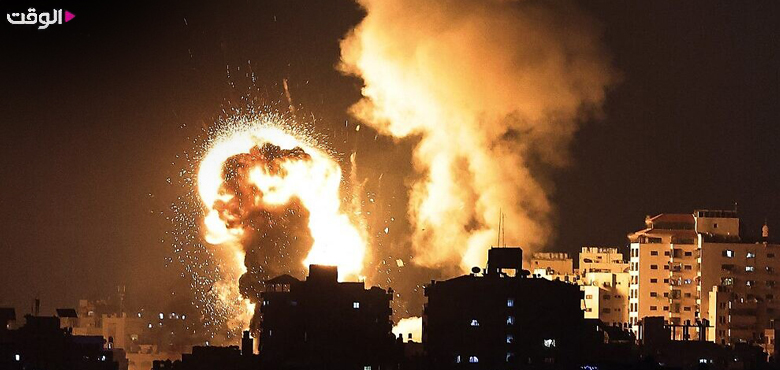Alwaght- The shaky Egyptian-brokered ceasefire between the Israeli government and Hamas after the 11-day war of May has showed its fragility recently as Israeli warplanes bombed on Saturday sites in the besieged Gaza Strip that led to three massive explosions in Khan Yunis neighborhood.
Following the attack, the Israeli army issued a statement saying that the strikes targeted a military post and a rocket-propelled grenade launcher belonging to Hamas, and that the regime's air force fired 12 missiles at the al-Qadisiyah site belonging to Hamas military wing Izz al-Din al-Qassam Brigades in the west of Khan Yunis.
Israeli provocations
The Israeli regime has said that the attack on Gaza was a response to rockets fired from the enclave off the coast of Tel Aviv on Saturday morning. Although Hamas said the firing of two rockets was on no purpose, the Israeli actions in the West Bank and Al-Quds (Jerusalem), as well as the decline of the Prime Minister Naftali Bennett cabinet in fulfilling its ceasefire obligations prove that Tel Aviv is the main cause of tensions and combustible situation.
Hamas has reportedly informed Egyptian mediators that the Israeli attack on the Gaza would provoke a response from the movement. In addition, Hamas has called the Israeli imprisonment of Hashem Abu Hawash, who has been on a 137-day hunger strike, an attempt to assassinate the Palestinian prisoner, and the Gaza resistance forces issued warnings, telling Cairo that if the prisoner dies, the calm would be upset.
Ziad al-Nakhaleh, the secretary general of the Palestinian Islamic Jihad Movement, said the Palestinian groups consider "possible martyrdom of Abu Hawash an Israeli terrorist action that would not go unanswered." Earlier, Israeli forces suppressed Palestinian protests at demolition of their homes by Israeli regime in West Bank, resulting in death of a young man on Friday.
The continuation of Israeli settlement projects after the truce deal drew reactions from Hamas. Last week, the Israeli cabinet approved $317 million in funding for settlement projects in the occupied Golan Heights to double the Jewish population in the occupied Syrian territory. Hamas spokesman Hazem Qassem, reacting to the bill, said that the biggest settlement project in Golan Heights was "a new aggression in the occupied territories."
Still, in the new Israeli provocative attacks certainly there is no aim for a new war.
After the 11-day war, the Israeli leaders have realized that any tension and movement against Hamas and the others in Gaza, the West Bank, and other occupied areas will be met with a reaction, beyond the Israeli army capability to contain. So, Saturday night's attacks were, actually, an attempt to calm public opinion and settlers and prove the ability to maintain the security of the occupied territories in case of Palestinian attacks. But there is no plan to continue the conflict. Israeli officials made it clear Tel Aviv is seeking no escalation but it wants to convey a message, telling the Palestinians that shooting on the border and rocket tests are "unacceptable."
In other words, the Israeli leaders are now dealing with an annoying fact for their security and it is that the Palestinian resistance now has broader support than ever across the Palestinian territories. On the other hand, the Jewish settlers are in increasing distrust and doubt about the legend of Israeli invincibility and any new war can draw deeper gaps among the Israeli citizens and increase the reverse migration.
Moving closer to end of ceasefire
While the Israelis are moving on the slippery edge of Hamas patience to make gains without a new war, the ceasefire continuing to hold has a slim chance.
On the one hand, despite Egypt's efforts to mediate a permanent ceasefire, no progress was made. The Israeli actions such as imprisoning and attacking the Palestinians, not allowing goods and materials to enter Gaza for reconstruction, and continuing the settlement leave the tensions ready to escalate any moment.
On the other hand, Egypt has been showing passivity in its task as a mediator to facilitate freedom of movement and trade exchange on Rafah border crossing, prompting Hamas doubt that Cairo is really working in favor of the Palestinians.
"The Egyptians have not done enough and despite their many promises to Hamas after the war, they declined to make real moves," said a Hamas official.
With these conditions ongoing, halt of Gaza reconstruction along with continuation of the siege would erode the ceasefire and tensions would resurge as a result of the Israeli provocations in Gaza and Al-Quds in a broader range.



























